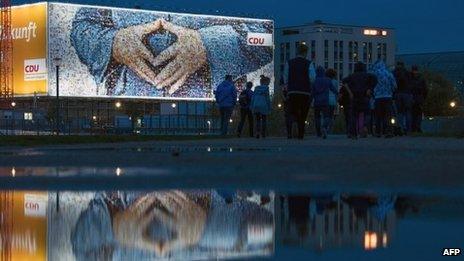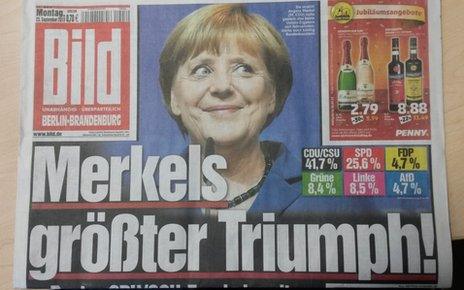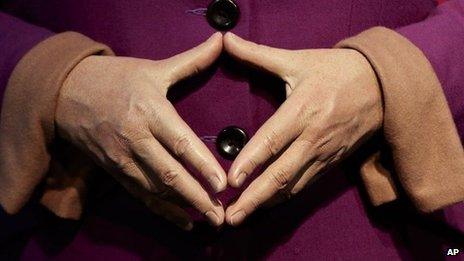Why Germans came home to 'Mummy'
- Published

Angela Merkel's party put her trademark hand gestures on its election posters
Nobody in Germany has a scintilla of doubt that this is a stunning victory for Angela Merkel.
Germany's most popular newspaper, Bild, calls it "Merkel's biggest triumph" in letters that fill the front page.
The results are in: she sails on into her third term, only a sliver short of an absolute majority.
The political wheelers and dealers will now try to negotiate a coalition that can be stable and dominant - but she is in the driving seat.
It is a personal victory as well as one for her Christian Democrat (CDU) party. She was the focus of all the advertising efforts. Its campaign was about her.
The adverts featured her in reassuring poses with soft words. The tone was invariably that she was the safe pair of hands in difficult times.
'Mummy's always there'
Her nickname "Mutti" was on the CDU's own banners - "Mummy".
One German pundit explained that: "Your mummy is always there for you. She doesn't care what she looks like but you can rely on her. Sometimes she might tell you to clean up your room but she's always there for you."
And that was the appeal to many voters. In difficult times, the CDU projected her as the safe pair of hands. Some adverts featured her hands positioned together, the fingers in the shape of a diamond or a heart, the way she does in countless pictures.
Many Germans like her image of an ordinary person without airs and graces - she has been spotted in the supermarket at the end of a heavy working day of ministerial meetings, wearing the same business suit - and buying leeks and olive oil.
When asked what Germany meant to her, she is reported to have replied "well-fitting windows"!
'Too pragmatic'
It is not that she lacks charisma - it is just that it is a different kind of charisma from the louder, brasher, more macho type. She sometimes seems awkward in live debate, but that may also be part of her appeal as an "ordinary person".

Bild proclaimed the result "Merkel's biggest triumph"
The other parties found it hard to dent this image. The Social Democrats (SPD) had attacked her policies, particularly on the rise of poverty under her governments. They said that Germany under Mrs Merkel had become a land of "mini jobs" and "precarious employment".
But one of the difficulties for the SPD was that it was an SPD Chancellor, Gerhard Schroeder, who drove through the labour market reforms which his critics say made it easier to hire and fire.
Of course, image alone would not have kept Angela Merkel in power so long. Clearly, if the economy had collapsed she would have been crushed in the failure. But the fact that Germany kept growing more strongly than other European countries helped.
Some critics say that her real weakness is that she solves problems only as they come at her. They say that she can be too pragmatic. A step-by-step approach, they argue, leads to a failure to see a long-term goal.
But in truth, nobody quite knows what Angela Merkel believes. She keeps her cards ultra-close to her chest - perhaps as befits someone who grew up in the state of the East German secret police, the Stasi.
When she talks of wanting "more Europe", it is not completely clear what she means by that - a transfer of power from national capitals to Brussels, or not.
Underestimated
And she is very good at adapting. She has what one German commentator called "an intuition for power". The other parties now recognise that instinct for power after the election drubbing she has dealt them.
In the past, she has been underestimated. It is said that her opponents in the CDU coined the term "Mutti" to patronise her. Her supporters - and the CDU's advertising agencies - turned it into a badge of honour.

The Merkel "diamond" even adorns her waxwork at Berlin's Madame Tussauds
Angela Merkel's negotiators may now sound out the Greens, who said "no way" before the election. The cold light of a post-election dawn might change minds.
But much more likely is horse-trading with the Social Democrats. The SPD wants a softening of austerity economics. They have talked of a Marshall Plan II for Greece. They may get some of that - but not much, because Chancellor Merkel may see the scale of her victory as an endorsement of her economic policy.
There has been a grand coalition before, in 2005. Some in the SPD say they do not want a repeat - but they will have to decide whether no power is better than some power.
The advantage for her and the CDU is that this "black-red" combination would be such a big bloc in the Bundestag, that whatever it decided would go through.
And the CDU has one big card to play: a failure to form a government that can govern might mean a new election. The other parties might wonder if they would do any better in these new circumstances.
A big election victory bestows big post-electoral clout. Mrs Merkel knows this and so do the vanquished - think for a moment of the Free Democrats, at whose party headquarters the tears were flowing.
A week ago, Guido Westerwelle was foreign minister, striding the world's halls of power. Today, he is an ordinary citizen.